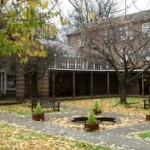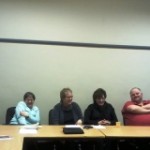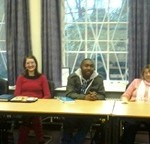It was a delight to return to Northern College of the Luther King House Educational Trust on Tuesday February 26th, this time as a moderator of General Assembly and as guest of the Dr Rosalind Selby (principal), her colleagues and students. It was a full day but one in which I learnt much, heard from and engaged with staff and students, and shared/participated in worship.
the Dr Rosalind Selby (principal), her colleagues and students. It was a full day but one in which I learnt much, heard from and engaged with staff and students, and shared/participated in worship.
It is no secret that ministerial formation – theological education in Britain is facing many challenges and a degree of uncertainty for a number of reasons. These include: constantly shifting contextual needs, narratives (perceived and real) of depletion whether it is about  church membership or finances, and the resulting reviews that our churches seem to be spending much time and energy on. For those who are responsible for the formation of ministers and laity this can be a stressful and challenging time. It is also a time to think creatively and out of the box! My conversations with the staff at Northern and Luther King House give me much hope and I am excited over their enthusiasm, commitment, and their strategic and creative thinking, and working together. The upbeat attitude of viewing challenges as opportunities models for me a good habit and example for those preparing for ministry.
church membership or finances, and the resulting reviews that our churches seem to be spending much time and energy on. For those who are responsible for the formation of ministers and laity this can be a stressful and challenging time. It is also a time to think creatively and out of the box! My conversations with the staff at Northern and Luther King House give me much hope and I am excited over their enthusiasm, commitment, and their strategic and creative thinking, and working together. The upbeat attitude of viewing challenges as opportunities models for me a good habit and example for those preparing for ministry.
Rosalind and I led worship (Word and Table) using a beautifully crafted liturgy and appropriately chosen hymns. The gathering had a real “family” feel to it, with all seated/gathered around the communion table as we welcomed each other, sang, prayed, read from the Scriptures, exchanged greetings of peace, gave thanks, and shared bread and wine together. And, if this reads like an early church gathering, perhaps a key difference in this instance would have been the presence of two signers who signed throughout the service for one of the students.
In my reflections (on Isaiah 55:1-9 the reading for the day) I noted that while the text was intended for a 6th century exilic context and for a people who had experienced exile and were in desperate need of hope, it very much speaks to our present reality of feeling spent, drained, empty and thirsting for something better, deeper and different. I reflected on what I termed the imperatives of generosity (or of a generous God) as captured in the text through the invitation to come, drink, buy, listen, see, and live. As we gathered around the table, I reminded all that, while loaves abound, there are still many being denied full life. Our vocation is to witness in word, deed and thought, to a generous God who offers fullness of life.
The conversation points generated through worship spilled over into a very crowded dining room and into the after lunch session where I engaged in further conversations with staff and URC and Moravian students. I enjoyed the engaging conversations on  current and relevant matters in the life of our Church that we discussed. And, impressed by the mature and considered contributions of the students, the thought crossed my mind that we need to find a way to involve those in training/preparation for ministry to also participate in the current conversations about structures and future of the United Reformed Church.
current and relevant matters in the life of our Church that we discussed. And, impressed by the mature and considered contributions of the students, the thought crossed my mind that we need to find a way to involve those in training/preparation for ministry to also participate in the current conversations about structures and future of the United Reformed Church.
At the end of this session, I ask students and staff if there is anything they wished to share  with the wider church. With their permission, and in some of my own words, I offer a summary of their insights:
with the wider church. With their permission, and in some of my own words, I offer a summary of their insights:
- In the midst of the need to change, beware of making decisions in haste. Learn from our ecumenical partners and our own history.
- Let us take time to discern what God is saying to us, waiting on the vision.
- We should not let “money” drive changes and the vision.
- God loves and always intends to bless the church. Let us be open to this blessing as we rethink what it means to be open, dynamic and flexible.
- We need to move on and forward rather than to be locked into narratives of the past.
- Let us always remember that WE are diverse and that in our living together we can differ and hold views with both commitment and openness.
- We have found the ecumenical environment for our training most enabling and empowering.
- And we must affirm ALL the invaluable and wise people resources of the United Reformed Church.
It is most appropriate to say “amen” to the above as we try to live these out. And, perhaps you may wish to add to the list!
